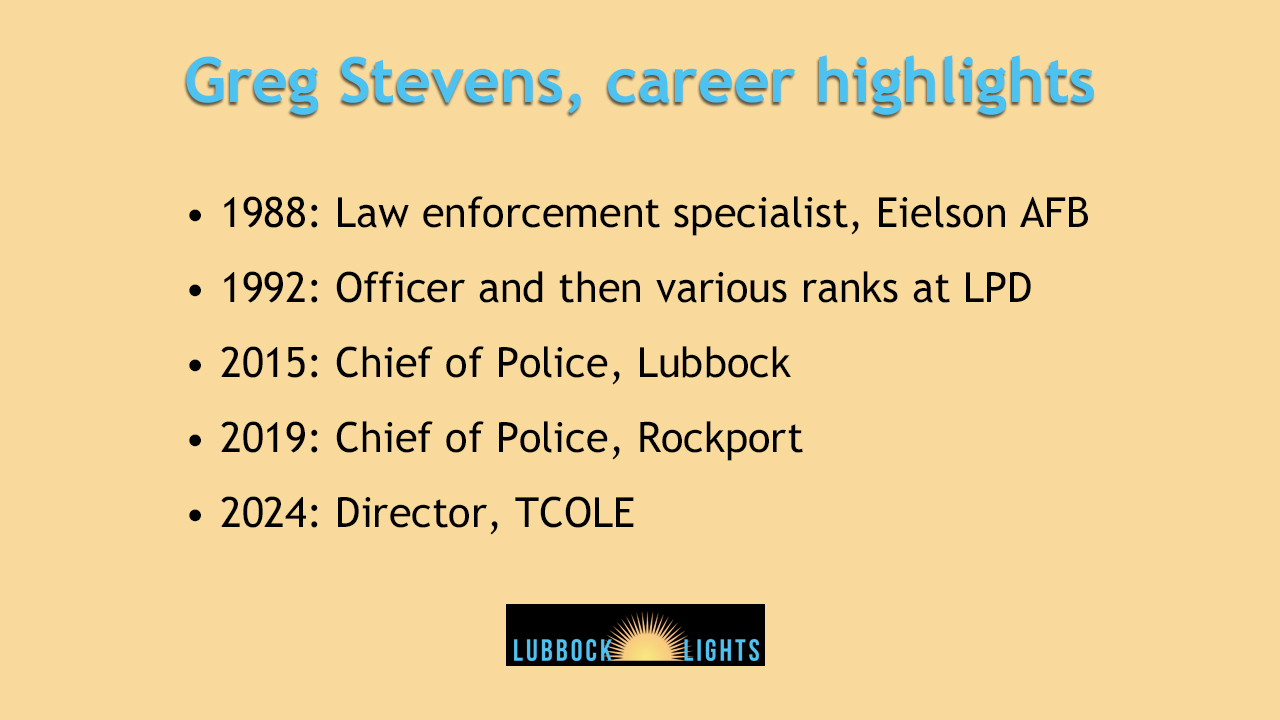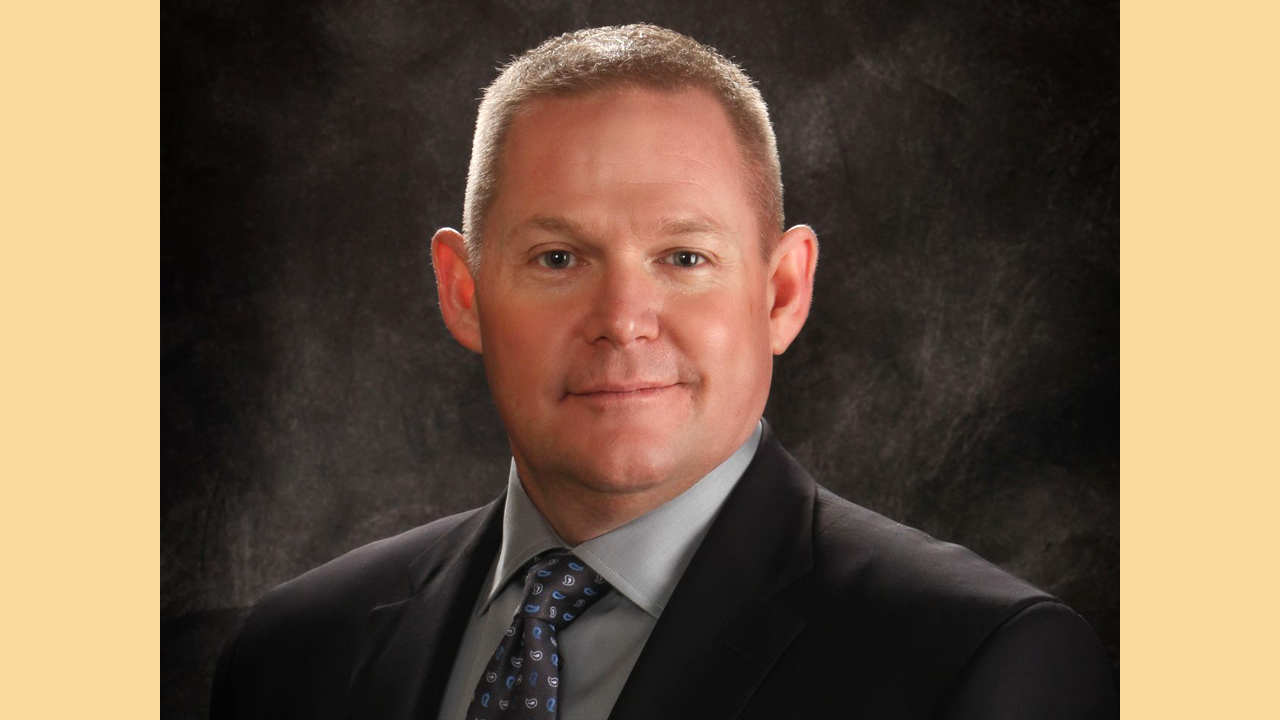(Image above: Greg Stevens, newly named director of the Texas Commission on Law Enforcement)
A teenage gunman murdered 19 students and two teachers in a Uvalde elementary school a year-and-a-half ago. It took law enforcement more than an hour to get into the classroom.
Actually, police, sheriff’s deputies or troopers did not breach the door. A U.S. Border Patrol team did and killed the shooter. Amid the search for a key, the room was not locked. Police could have gotten in much sooner.
“We found systemic failures and egregiously poor decision making,” a legislative investigation said.
The scrutiny did not end in Uvalde.
All of Texas law enforcement came under a microscope by the state’s Sunset Commission – an agency that can shut down bureaucratic waste in the government. Texas’ approach to regulating law enforcement was – and still is – ineffective according to the Sunset Commission. Its focus was on TCOLE – the Texas Commission on Law Enforcement.
“ … The Sunset review of TCOLE found the state’s current regulation is, by and large, toothless. Texas’ regulatory approach has resulted in a fragmented, outdated system with inadequate training, lack of statewide standards, and inconsistent accountability,” the commission said.
The guy who gets to fix it, starting January 8, is Greg Stevens, former Lubbock police chief.
Stevens gets the job
The commission announced the hire Dec. 7.
“His extensive law enforcement background, combined with his military and educational experience, made him an ideal candidate. The commissioners and I look forward to working with him,” said Kim Lemaux, the commission’s presiding officer.
When accepting the job, Stevens told the commissioners, “I grew up wanting really nothing more than to be a police officer. That was my life’s goal. In 1992, I got into a Lubbock police car and: goal accomplished.”

Stevens grew up in Amarillo.
“I graduated high school by the hair of my chin, and I wasn’t going to go to college,” he said.
He could not apply to be a police officer until age 21 and Amarillo’s police department had a nepotism policy. It would not consider him while his father was an officer there.
“So, my dad took me to a recruiter and said you’re going to go in the military, and you can be a military policeman right now. And I said, ‘All right, sounds good to me,’” Stevens said.
Four years later, Stevens applied to police departments all over Texas. He tested with Lubbock.
“I came out No. 2 on the test in Lubbock,” Stevens said. “I thought, ‘Man, that’s awesome. It’s close to home, same size’ and that was it.”
By the time Stevens could have joined Amarillo’s force, he’d found a home in Lubbock and “loved the police department.”
“Talking with the media is usually a distasteful assignment,” his job evaluation said. “But Sgt. Stevens accepted the assignment without complaint.”
Having served in the Air Force, Stevens joined the naval reserve in 1998 and was called for active duty nine days after the September 11 attacks.
“I got back in 2002, I had no college,” Stevens said. He was 32, a sergeant with no college degree and thinking to himself, “What’s my long-range goal here?”
He earned a bachelor’s degree from Wayland Baptist and later an MBA from Texas Tech.
In 2002, Sgt. Stevens earned high marks on a job evaluation. His supervisor assigned him to talk to the news media about traffic violations.
During that time, he and his wife joked, “‘Who knows! Maybe someday I could even be the chief of police.’ And we sort of laughed it off.”
Controversy rocks Lubbock police
In 2012, Lubbock teenager Mark Ysasaga went missing. That led to a high-profile community effort to find him with plenty of news media and social media attention.
A Crime Line tip in 2015 led officers to his body south of Lubbock. And that’s when trouble began for Lubbock Police.
Local news outlets, based on both law enforcement sources and social media statements from a “person of interest,” raised questions about a $10,000 Crime Line reward. Police never confirmed or denied one of the people involved in Ysasaga’s shooting death was paid the money.
Two assistant chiefs were reassigned and the police chief was demoted. Roughly two months later, Stevens earned the title of police chief.
“We weren’t real transparent in a lot of the things that we did,” Stevens said of that time. We had to acknowledge that. We had to build trust with everybody from citizens to the media.”
Internally, trust inside the department was not good either, Stevens said.
Changes at LPD
Rayland Goswick, president of the Lubbock Professional Police Association, believes Stevens took action to increase morale in the department.
“He started allowing us to purchase more modern equipment. So, we got improved flashlights, and we changed our weapons,” Goswick said.
“For daily patrol operations, we had been stuck with what looked like the 1965 LAPD uniforms for years,” Goswick said. Stevens allowed the uniforms to be more practical.
“He was pretty transparent with the media,” Goswick said. “He wasn’t afraid to tell you what he was doing and why he did it.”
As chief, Stevens:
- Modernized uniforms, equipment and scheduling.
- Changed procedures for writing police reports to disclose detailed information about crimes.
- Developed an interactive crime map so citizens could find police reports anywhere in the city, including their own neighborhoods.
- Would go to major crime scenes.
- Held press conferences when officers were accused of using excessive force.
- Initiated a special Driving While Intoxicated unit and a joint effort with the Lubbock County Sheriff’s Office called the Metropolitan Special Crimes Unit.
No less than nine times in his conversation with LubbockLights.com, Stevens talked about “owning” responsibility for both success and failure.
“I’m a person that owns everything,” Stevens said.
By the time he left to take a job in Rockport, Stevens said, “We reached full staffing.”
That means the department was able to recruit and keep officers.
Time to change Texas
“I can’t say that I was immediately interested in it,” Stevens said of the commission job opening. He was the chief in Rockport along the Texas coast. It’s a community of 10,000 people with a beach and golf courses – nice weather all year around.
“But pretty quickly I became interested because I saw the opportunity that it presented,” Stevens added. Other police chiefs in Texas asked him to look at the job opening. He did.
Stevens starts with deadlines imposed on the commission by a new state law.
By March 1, 2024, it must adopt new policies for training, medical or psychological examinations and suspending or revoking an officer’s license.
By September 2024, it must have a publicly accessible database for the public to look up an officer’s license. There are exceptions for officers working undercover.
Starting January 2025, it will have increased authority to suspend an entire agency’s right to hire licensed officers with some exceptions.
An interim director is already working on the changes before Stevens begins.
“I feel like Texas should lead the way in – well – in everything, but certainly in public service,” Stevens said.
Stevens will have authority to guide training and licensing standards.
“It provides a real opportunity for national leadership,” he said,
At first the goal is to meet the new requirements in state law. After that, he hopes to build partnerships and relationships all over Texas.
The eventual goal is: “Texas becomes the national leader in terms of police standards and training.”
There was anger directed at police after the George Floyd case in Minneapolis and it’s still in people’s minds. The civil rights clashes of 1960s are too, Stevens said. There are still lessons to be learned from Ferguson, Missouri and the Rodney King case.
“George Floyd is not something that we need to say we’re done with and move on. We’ve got to look at that and always say, ‘How?’ How did that happen? It’s almost always going to be a failure of leadership when we have these bad things occur,” Stevens said.
But sometimes the policies are not good enough.
“In Lubbock, you’ve got the Tim Cole case,” Stevens added as an example of why law enforcement must always get better and set higher standards. “You have a guy that’s convicted, goes to prison, dies in prison for a crime he didn’t commit – had nothing to do with it. And it was based on bad eyewitness evidence.”
Faith and philosophy
Stevens said he leans his on faith a lot.
“I’ve got a pretty deep relationship with Christ. I pray about decisions. I ask for guidance,” he continued. “I hope I don’t let people down.”
For every job he ever had, he said, “I’m going to do my very best.”
“You’re certainly going to do some good if your goal is greatness, even if you don’t reach your own personal goals, then you’re still going to do some pretty good things.”


 Facebook
Facebook